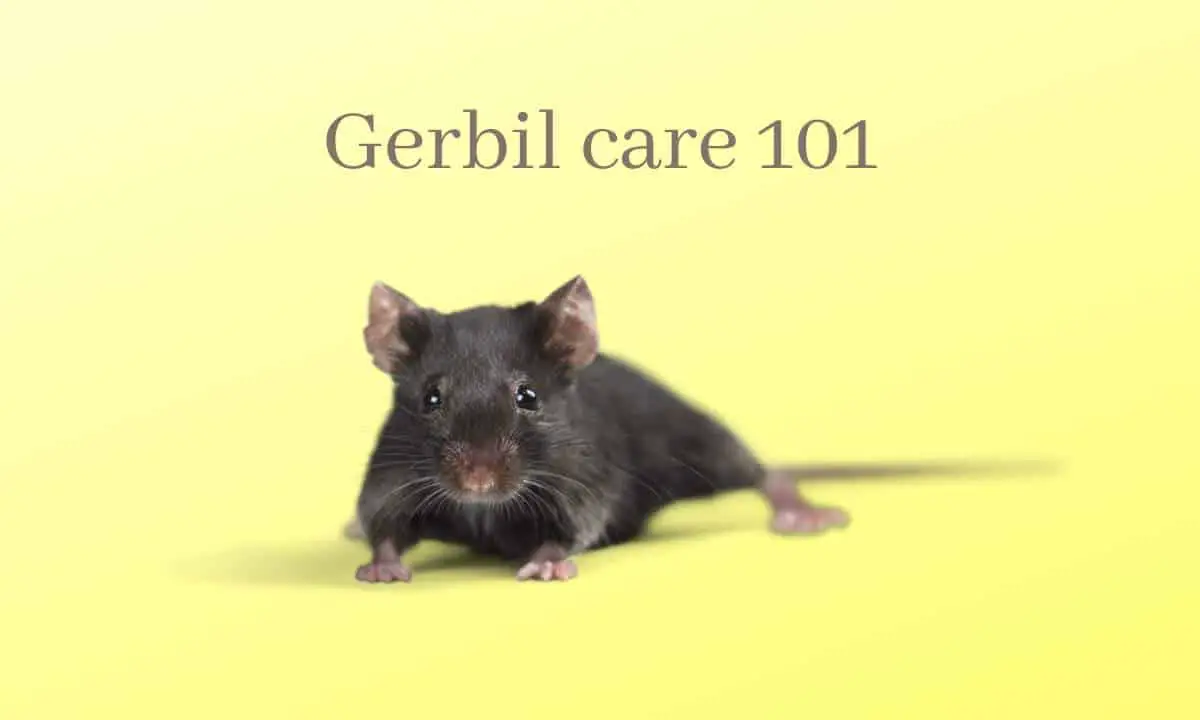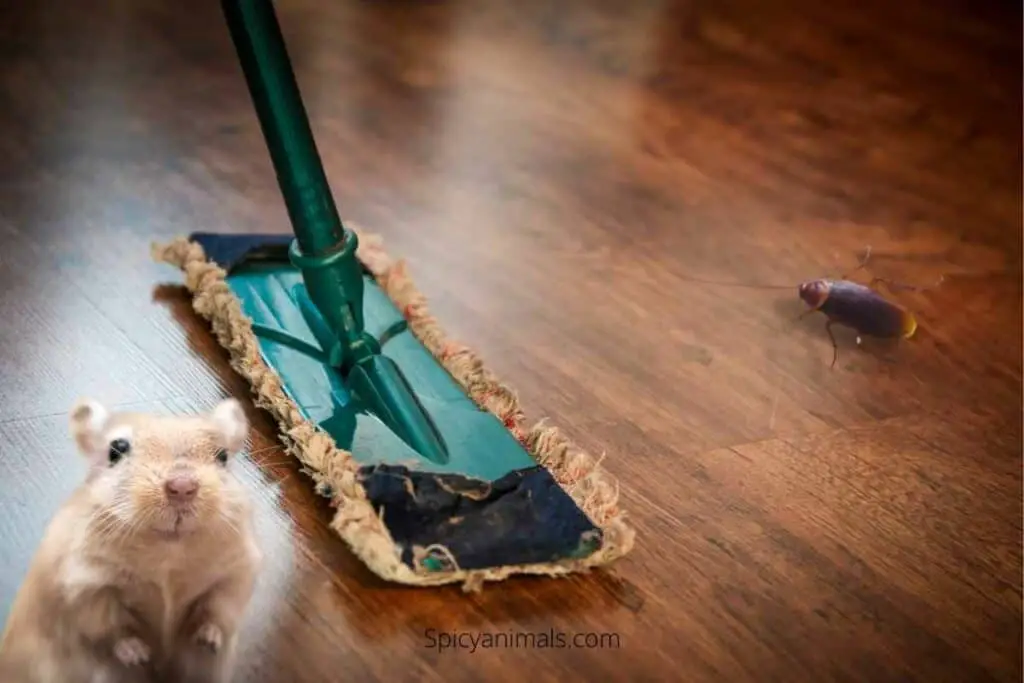Owning a gerbil can be a wonderful experience! Gerbils are affectionate, playful, and low-maintenance pets that can bring joy and companionship to the lives of their owners.
In this article, we’ll discuss some basic gerbil care tips and information that will help new gerbil owners get started on the right foot. Let’s begin by exploring what it takes to provide the best care for your pet gerbil.
Table of Contents
Benefits of owning a gerbil
Owning a gerbil can bring much joy and entertainment to your life. Whether you are an experienced pet owner or a first-time pet guardian, gerbils are a great choice for potential companionship and enjoyment.
Gerbils are social animals that love interacting with their owners – you can even teach them how to do tricks! For anyone looking for an intelligent, active, and friendly companion, gerbils provide all of it in droves.
Gerbils require minimal effort when it comes to grooming and overall maintenance.
Keeping the cage sanitary is one of the most important steps in keeping your gerbil healthy, but the most difficult job has been using an appropriate substrate layer that they can burrow through and make cozy beds inside their cages!
Also, since they’re small enough to fit in the palm of your hand or crawl around in your pocket (if properly trained), no longer will you be confined to having pets that need large living spaces like dogs or cats would require.
Plus, these little guys aren’t nearly as noisy compared to other animals.
Most importantly, their distinct personalities bring unique characteristics that create engaging relationships with owners – they may come off as shy at first but opening up towards them over time will surely foster trust and have them thriving quickly under your care!

Overview of basic gerbil care
Gerbils are popular small pets, a great choice for beginner owners and people living in smaller living spaces. They are lively, friendly animals that enjoy interacting with their owners and the environment around them.
Gerbils have specific needs and care requirements that should be met in order to ensure they lead a healthy and happy life.
This guide will provide an overview of basic gerbil care so prospective new owners can get an insight into what they need to provide for their pet’s daily needs.
This includes information about what type of cage is suitable, appropriate bedding materials to use, appropriate foodstuffs to feed them, and how to keep their environment enriching and stimulating for them.
It is important to gather as much information as possible before purchasing any kind of pet, so get reading!
Housing
Housing for gerbils should be large enough for the little critters to scamper around, plus provide plenty of ventilation and easy access.
Gerbils need ample space since they are active animals that love to explore and play. An ideal cage should be at least 20 gallons, or 30 inches long and a foot deep.
Cages lined with a soft absorbent material, like paper-based bedding, allow your gerbil to build nests and enjoy burrowing.
Make sure to include plenty of hideouts to keep your gerbil out of sight and away from stress.
Choosing the right cage
Finding the perfect home for your pet is an important part of owning a gerbil. Start by selecting a cage that is spacious enough for your little friend to move around and explore.
Gerbils need a home that measures at least 10 gallons per rodent, with even more space if you are housing multiple pets. Look for options featuring several different levels or ramps they can climb, as well as plenty of hideaways they can explore and tunnels they can tunnel through.
Make sure the cage has bars to provide ample ventilation and talk to your local pet store about whether you should use glass or wire mesh construction since gerbils are agile climbers who may be able to escape from cages with thick mesh if it isn’t secured properly.
Encourage natural digging habits by providing an appropriate substrate for your gerbil to tunnel through such as Repti-Sand, Aspen bedding, or shredded paper towels.
Limit the amount of dust-producing materials and opt for larger or thicker grains, not fine sand. Additionally, you can provide paper towel rolls or cardboard tubes as toys — just be sure to switch them out consistently so they aren’t covered in germs and other dirt buildups.
Lastly, include at least one hideout house in your design — milk crates typically work great. This will give your pet somewhere safe and secure when it’s time for a break!
Setting up the cage
Before bringing your gerbil home, make sure you have set up the perfect environment for its housing. A suitable cage should be made from non-toxic materials, provide adequate space for your gerbil to move around, and be easy to clean.
The minimum recommended size is 30” wide x 15” deep x 18” high and it should contain two levels with ramps or stands connecting them.
Be mindful of the materials you choose for the cage. Steel or metal cages can get too hot and plastic cages may be chewed by your pet, so opt for wooden enclosures that provide superior ventilation and insulation.
Pearwood is an ideal material due to its durability and natural shape that makes it comfortable and easy to clean.
An acrylic bottom panel may have to be included in some cages to prevent chewing of wood chips out of the cage by your gerbil.
For bedding options, steer away from pine or cedar shavings which are known irritants for small animals like mice and hamsters.
Aspen shavings are a good alternative because they are soft on paws, retain warmth easily, reduce odor build-up (also important when used with aquarium-style housing), and absorb moisture efficiently as required between cleaning cycles.
Sloped beds designed specifically for gerbils can also be purchased online but make sure these are lightweight in case of escapees!
Provide a variety of toys such as wood blocks, ceramic tubes, tunnels, nesting boxes and platforms in the enclosure so your rodent can explore its new home away from boredom while expressing its natural curiosity – chewable items should never be left unsupervised though!
Supplement food bowls with smallholder dishes that attach securely (make sure nothing rattles!)to keep everything neat during feeding times.
With these tips in mind, adaptable housing will ensure comfort not only for your gerbil but also peace of mind when opening that cage door!
Cleaning the cage

When it comes to cleaning your gerbil’s cage, it’s important to get into a routine. This means cleaning their bedding, litter and play items every two or three days.
While gerbils are neat creatures that like to keep things clean for themselves, their habitats need occasional deep cleanings. It’s recommended that you perform a complete cage cleaning once a month.
Start by removing your gerbil from the cage and keeping them in a safe environment until you’re finished cleaning. Before putting them back in the cage, make sure everything is dry – you don’t want them scrambling around on wet surfaces!
Then, remove all of the bedding and soiled materials such as fecal matter or uneaten food waste. Be sure to dispose of these materials properly.
Next, wipe down all of the surfaces in the enclosure with warm water and white vinegar or a pet-friendly cleaner – some commercial products are available specifically for this purpose or you can make your own using natural ingredients like baking soda or borax powder.
Rinse any surfaces thoroughly with clean water and let the entire enclosure dry completely before replacing any materials including food dishes, chewing accessories, and toys. Lastly, add fresh bedding suitable for your gerbils such as paper-based options such as CareFRESH Natural Bedding or Kaytee Clean & Cozy White Bedding (available online).
Now let your beloved little critter back into its freshly cleaned home!
Nutrition
When it comes to proper gerbil care, nutrition is an important aspect that must be taken into consideration. Gerbils, like all rodents, require a high-fiber, low-fat diet that is made up of high-quality, fortified, and complete small animal foods.
Additionally, hay and fresh vegetables can be offered as treats or snacks.
Here, we will discuss the importance of proper nutrition for gerbils and the types of food that should be offered.
Commercial gerbil food

Commercial gerbil food is the best source of balanced nutrition for your pet. Ask your veterinarian or consult with a reputable pet store to find out what type of food they recommend. A quality blend should provide a mix of proteins, fats, carbohydrates, vitamins and minerals formulated especially for gerbils.
Avoid mixes containing large amounts of seeds as gerbils love to eat seeds and may fill up on them without getting enough of the other nutrients they need.
Be sure to provide fresh food daily and remove any leftover bits before offering a new bowlful to keep the food from becoming moldy.
Along with pellet or seed-based foods, you can supplement their diet with fruits and vegetables, nuts, cooked grains such as oatmeal or millet and other healthy treats like cooked eggs or small pieces of lean meat if desired.
Offering fresh greens like alfalfa sprouts can be a fun way for your gerbil to get vitamins and additional fiber – just avoid vegetables such as kale, spinach and broccoli as these contain substances that may interfere with vitamin absorption in gerbils.
Supplements
Besides providing your pet with a nutritionally balanced diet, regular vitamin and mineral supplements should also form part of your gerbil’s care routine.
Gerbils cannot manufacture some of their own vitamins and minerals, so it is important that they receive suitable supplements to make sure they remain healthy.
As a general rule, vitamin and mineral supplements should be given once per week or every other week. It is possible to buy in-powder form dietary supplement specifically designed for gerbils.
These are ideal as you can add the powder directly to their feed bowl without making any mess.
If these powders are not available in your local pet store, then you could try an all-in-one calcium-based multivitamin formula that is suitable for both rodents and rabbits as well.
Treats
Treats should count for 20 percent or less of your gerbil’s daily calorie intake. Your pet gerbil will love treats like sunflower seeds, pumpkin seeds, and scrambled eggs.
You can also give nut-based treats in moderation and buy prepackaged treats specifically designed for gerbils.
Nuts like peanuts and almonds should be avoided, as they can be high in fat that can make your pet obese and prone to heart disease.
Always wear gloves when handling gerbils or their treat, as you don’t want to pick up any external parasites that could affect their health.
Grapes and raisins are not recommended due to their high sugar content.
Offer fruits such as apples and oranges instead, but only one piece of fruit a day so your little pal doesn’t fill up on sweets before adults, which could lead to vitamin deficiencies.
Exercise and Play
Exercise and play are essential for keeping your gerbil healthy and happy. As mammals, gerbils need a stimulating environment that includes regular play and activities.
Providing your gerbil with a variety of playthings, tunnels, and other enrichment items can help stimulate its natural drive to explore and play.
Here, we’ll outline some basic tips for how to provide your gerbil with the exercise and play it needs in order to remain healthy and happy.
Toys and playtime

Gerbils require ample interactive playtime and mental stimulation to remain healthy and happy. For this, the best option is to provide a variety of toys that your gerbil can play with within its enclosure.
The toys should have fabric, ropes, cardboard tubes, wheels, ladders, and other items that promote exploring and playing.
Boredom can lead to depression or behavioral problems in gerbils, so adding new toys every couple of weeks or so should help them stay entertained. Additionally, setting up an exercise wheel can provide valuable exercise opportunities for your gerbil during its active hours.
Pointed edges should be avoided on wheels as these can cause painful lesions on the gerbil’s tail or paws if used for too long.
There are also a number of games you can play with your pet gerbil to keep it content.
These include offering treats from various containers such as cardboard tubes or popsicle sticks; trying to get them into an enclosed space like a cardboard box; teaching simple tricks like rolling over or fetching; and playing hide-and-seek with treats around the enclosure.
All these activities are very fun for gerbils but should be supervised carefully by their owners at all times.
Exercise wheels
An exercise wheel is an essential part of creating a happy, healthy environment for your gerbil. Encouraging physical activity with daily use of an exercise wheel helps to offset obesity and related health issues as well as provide something fun and stimulating.
They help keep your gerbil entertained while they are in the cage, and offer excellent opportunities for strengthening their muscles and bones.
When considering the right type of wheel for your pet’s needs, keep in mind the size of their living space and consider the material used to make their new toy.
Plastic wheels are lightweight, easy to clean and come in a wide selection of colors that appeal to any playful personality. Metal wheels are harder wearing with a solid construction that withstands rough play and long-term usage.
Both types come in various sizes so it’s important to make sure you choose one that is suitable for your gerbil’s height – or check how much space it takes up – before making a purchase.
Your gerbil should always have free access to their wheel when inside its cage, or anywhere else that you allow them full run around time during the day—just make sure there are no other distractions like toys knocking into it or other pets distracting them from enjoying their fun time!
Health Care
Getting a pet gerbil is an exciting experience, but caring for them requires a bit of work and knowledge. Health care is an important part of gerbil ownership, and with the right know-how, you can help keep your little friend healthy and happy.
Here are some basic tips for caring for your pet gerbil’s health.
Signs of illness
Gerbils are generally very healthy animals, but it is important to be aware of the signs of illness. Knowing the signs before they become serious can help you get your gerbil the medical attention it needs as soon as possible. Depending on the illness, early intervention can mean the difference between life and death.
Signs of possible health problems include:
- Lethargy or loss of appetite
- Hair loss or bald patches
- Bumps, sores or wheezing
- Redness around eyes, ears, nose or other parts of the body
- Change in eating/drinking habits
- Change in droppings (size and amount)
- Diarrhea
- Runny stools
- Vomiting or coughing
- Constant scratching or biting at fur or skin
If you notice any of these symptoms in your gerbil, contact a qualified veterinarian for diagnosis and treatment as soon as possible. Early diagnosis and treatment could save your pet’s life!
Veterinary care
Veterinary care is an important part of keeping your gerbil healthy and happy. Annual checkups for gerbils are especially important, to ensure they are healthy and receive any necessary treatments or medications.
Because gerbils are prey animals and can be prone to illnesses, regular veterinary checkups can help detect potential problems early, before they become serious.
Gerbil owners should also look out for any signs that could indicate their pet needs medical care.
These include changes in behavior, such as lethargy or aggression; sudden changes in weight; hair loss; alopecia (accumulation of patches of furless skin); mites or other parasites; poor coat condition; soft stools (poo); discharge from eyes, nose or mouth; weakness in the limbs; lumps or masses.
If you notice any of these signs in your gerbil, it’s important to contact a veterinarian for further advice and treatment.
Even if your gerbil appears to be healthy, regular visits to the vet will help ensure that illnesses and conditions don’t go unnoticed.
Before visiting the vet with your pet rodent, talk to them about the risks posed by anesthetizing a small animal — this may be necessary for certain treatments — as well as how best to prepare your gerbil before bringing it into their practice.
That way you can rest assured knowing that your pet is receiving the best possible veterinary care.
Grooming
Proper grooming is important for the health of your gerbil. Make sure to brush your gerbil’s fur at least twice a week, as matted fur can cause skin irritation and bacterial infection.
It is also important to trim your gerbil’s nails regularly – about every two weeks. The best way to do this is with a pair of small nail clippers made specifically for small animals.
If the nail gets too long, it will start to curl under and make it uncomfortable – even painful – for your gerbil to move around.
Finally, check your gerbil’s ears on a regular basis. Dirt or ear wax can cause an infection, so if you notice anything unusual notify your veterinarian immediately.
Conclusion
Taking care of a gerbil can be a fun and rewarding experience. However, it is important to remember that they require proper nutrition, dedicated attention, and lots of care.
Following the easy tips discussed above will help ensure your gerbil’s long-term health and happiness.
By providing your gerbil with nutritious food, clean water, and a healthy living environment free from stress, you will create the perfect environment for your beloved pet to thrive in.
With regular care and attention, you can enjoy many years with your furry little friend!




